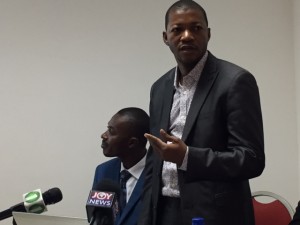Researching the politics of development
Blog

What are our findings on Ghana?

Anna Webster
13 April 2016
So the ESID team are back in Manchester following a great week in Ghana. It was a hot and steamy 30 degrees in the vibrant city of Accra and during a brief power cut we realised how thankful we were for the AC! Debate and discussion on the politics of development in Ghana was heated and Ghanaians were particularly engaged in the pressing issues affecting their lives and livelihoods. These included public sector reform, structural transformation, natural resources, education and health. Working with our fantastic hard working partners, CDD, we held an intense few days of events at GIMPA, UGBS, The World Bank and ISSER. We also attended a packed schedule of appearances on Ghana’s TV and radio and at one point we were right across Ghana’s airwaves. Discussion and debate continued into the evening and some of us are now vowing to stick to lettuce after consuming copious amounts of the heavyweight specialities banku and fufu.
Working with our fantastic hard working partners, CDD, we held an intense few days of events at GIMPA, UGBS, The World Bank and ISSER. We also attended a packed schedule of appearances on Ghana’s TV and radio and at one point we were right across Ghana’s airwaves. Discussion and debate continued into the evening and some of us are now vowing to stick to lettuce after consuming copious amounts of the heavyweight specialities banku and fufu.
The week was also a vital opportunity to get feedback on our research. We based our presentations and discussions on four briefing papers and from discussions and questions were able to consolidate our findings. These can be divided into four key areas:
- Competitive clientelism has undermined the long-term vision and capacities required for structural transformation in Ghana, including short-termism, electoral imperatives, and patronage. The problem is not competition itself, but that in Ghana everything is up for competition. Systemic changes may be required, for example going past the winner-takes-all model. However, our focus is on how democracy can be safer for development in Ghana. Our research shows how you can navigate the political space that you have. There’s a need to take advantage of the democratic dividend that is civil society, the media space, etc., the commitment to being rule-bound around elections.
- There needs to be a balance between top-down capacity and bottom-up accountability. Neither is robust enough to work without the other in the context of Ghana’s competitive clientelist political settlement.

- Our evidence on ‘what works’ suggests that there is a strong case for approaching the promotion of state capacity in Ghana with a more realistic agenda of supporting ‘pockets of effectiveness’ in a range of key areas. There needs to be coordination and coherence in the full sector to get the best out of these pockets of effectiveness.
- Coalitions need to mobilise around these pockets of effectiveness. Given the extent to which Ghana’s governance problems flow from the constraints that its political settlement places on elite and non-elite players acting collectively to resolve binding constraints, the role of coalitions that can bring together the ideas and agency of multiple stakeholders is critical. These coalitions need to combine top-down and bottom-up, informal and formal, political and bureaucratic.
